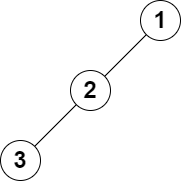Problem
You are given the root of a binary tree and a positive integer k.
The level sum in the tree is the sum of the values of the nodes that are on the same level.
Return** the **kth** *largest* level sum in the tree (not necessarily distinct)**. If there are fewer than k levels in the tree, return -1.
Note that two nodes are on the same level if they have the same distance from the root.
Example 1:

Input: root = [5,8,9,2,1,3,7,4,6], k = 2
Output: 13
Explanation: The level sums are the following:
- Level 1: 5.
- Level 2: 8 + 9 = 17.
- Level 3: 2 + 1 + 3 + 7 = 13.
- Level 4: 4 + 6 = 10.
The 2nd largest level sum is 13.
Example 2:

Input: root = [1,2,null,3], k = 1
Output: 3
Explanation: The largest level sum is 3.
Constraints:
- The number of nodes in the tree is
n. 2 <= n <= 1051 <= Node.val <= 1061 <= k <= n
Solution (Java)
/**
* Definition for a binary tree node.
* public class TreeNode {
* int val;
* TreeNode left;
* TreeNode right;
* TreeNode() {}
* TreeNode(int val) { this.val = val; }
* TreeNode(int val, TreeNode left, TreeNode right) {
* this.val = val;
* this.left = left;
* this.right = right;
* }
* }
*/
class Solution {
public long kthLargestLevelSum(TreeNode root, int k) {
Queue<TreeNode>q=new LinkedList<>();
q.add(root);
//long maxSum=0;
ArrayList<Long>maxArray=new ArrayList<>();
while(!q.isEmpty()){
List<Integer>list=new ArrayList<>();
int count=q.size();
for(int i=0;i<count;i++){
TreeNode cur=q.poll();
list.add(cur.val);
if(cur.left!=null){
q.add(cur.left);
}
if(cur.right!=null){
q.add(cur.right);
}
}
long sum=0;
for(int i=0;i<list.size();i++){
sum+=list.get(i);
}
maxArray.add(sum);
}
if(k>maxArray.size()) return -1;
Collections.sort(maxArray);
return maxArray.get(maxArray.size()-k);
}
}
Explain:
nope.
Complexity:
- Time complexity : O(n).
- Space complexity : O(n).